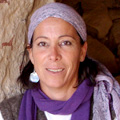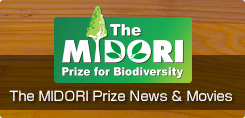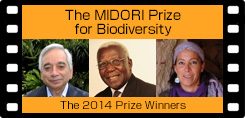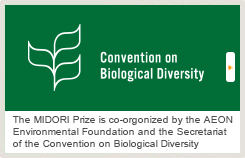The MIDORI Prize for Biodiversity 2014

- Bibiana Vilá
- Argentina
Director, Vicuñas, Camelids and Environment (VICAM)
Principal Researcher, National Research Council (CONICET) Argentina
Remarks
It is a great honour for me to accept the AEON Environmental Foundation MIDORI Prize for Biodiversity 2014, co-hosted by the Convention on Biological Diversity Secretariat. I wish to acknowledge the two institutions and my nominator.
This award is very prestigious, carries a great reputation and I am very happy to receive it. Upon receiving the MIDORI Prize, I feel very grateful to life that allowed me to pursue a project that is an essential part of me. The Argentine National Research Council CONICET has been and is my main institution since I was 23 years and I started a career in the high altiplano mountains, studying wild vicuñas. Currently I am the head of VICAM: Vicuñas, camelids and environment, a wonderful interdisciplinary group of colleagues who are in part responsible of this award.
Vicuñas are really beautiful animals, very interesting species in biological, and ecological terms, as well as very valuable for its high symbolic, social and economic value for indigenous communities of the High Andes.
I developed a career doing scientific research on vicuñas thereby providing a basis for decision-making in conservation and management of the species. I am always paying careful attention to the traditional knowledge, the ideas, beliefs and suggestions of the people of the altiplano. Our sustainability decisions are the mixture of scientifically data and locally based ideas that include issues on animal welfare, governance and ethics.
Vicuñas bear one of the finest fibers in the world highly appreciated. Sustainably used in pre-hispanic times, the vicuñas after the conquest were slaughtered in great numbers to export their skins to Europe. In republic times poaching continued and in mid XX century vicuñas were in danger of extinction. Several decades of intensive conservation measures that were respected by local communities enable now the possibility of the sustainable use of this animal. To do that, we recover the pre-hispanic chaku technique associated with modern animal welfare management in a bottom-up strategy with the local communities. Mountain ecosystems are fragile, and the local sustainable development enhances mountain people to maintain their livelihoods thus staying in their land and culture.
Nature and wild animals are a source of happiness for the sensitive human beings. I am sure all the people who are here today, agree that our mission on Earth is to conserve wilderness for scientific, ethical and spiritual values. Pachamama, Mother Earth is a powerful deity in the Andes.
My love for animals and wonder for nature began in childhood through the teachings of my grandmother, Meme. My mother was also an animal-loving person.
I would like to dedicate this award to these two women so important for me, my husband Hugo, and my sons.
Reasons for Awarding the Prize
Regarding the conservation of wild vicuñas (*1) in the Andean altiplano, Dr. Bibiana Vilá (b. 1961) has led the implementation of conservation measures integrating both traditional knowledge of indigenous communities and modern science including ecology, ethology and animal welfare. Also, she has made significant contributions by integrally promoting support to local communities and the implementation of environmental education. This has been achieved through the sustainable use of economically high-value vicuña fiber or fibre realizing both the conservation of wild animals and the stable development of regional communities, and through leading a local-based and globally important project.
Dr. Vilá’s achievements in the conservation and sustainable use of vicuñas can be situated as a modern model for conservation and are very significant. In the Andean altiplano, vicuñas are a wild species of enormous ecological, economic, and socio-cultural importance, and highly prized for the utility of their fine fleece. However, vicuñas were slaughtered in large numbers for centuries and their population massively decreased. In order to attain a recovery of numbers and their sustainable use, Dr. Vilá has led Vicuñas, Camelids and Environment (VICAM*2), a research group, and recovered, in consort with local Andean communities, an ancient pre-hispanic wildlife capture technique, the “chaku,” that enables shearing fiber from live vicuñas by surrounding them. The group has developed approaches which will permit the regular capture and shearing and release of wild vicuñas. The approaches generate income for economically deprived indigenous communities and give the communities the incentives of conservation of ecosystems and species. The group’s efforts aim at long-term vicuña conservation and stabilization and the improvement of livelihoods for indigenous communities. This is achieved through blending local indigenous knowledge and a modern scientific approach, encouraging the independence of local indigenous communities, and implementing environmental education. Her activities are a good example of realizing the concept of “living in harmony with nature.”
Dr. Vilá’ s contributions as a leader who has realized both the conservation of wildlife and stable development of local communities are highly evaluated.
(*1) Vicuñas
Vicuñas are wild South American camelids. Vicuñas are listed under Appendix II of the Convention on International Trade on Endangered Species (CITES) (some populations in Argentina and other countries, are still vulnerable and listed in Appendix I). Fine vicuña fiber is treated as a luxury item.
(Note: Some populations are listed in ap I and others are listed in ap II, depending on the conservation situation, it is not a rule for the entire species)
(*2) Vicuñas, Camelids and Environment (VICAM)
VICAM, a research group on vicuñas, camelids and the environment, has approached conservation aspects from biological and social science perspectives, including environmental education. Twelve researchers promote the scientifically-based sustainable use of biodiversity while respecting the traditional perceptions of indigenous communities.
Profile
Dr. Bibiana Vilá is Principal Researcher of the National Research Council (CONICET) Argentina and Director of the Vicuñas, Camelids and Environment (VICAM). She has run, a practical and symbolical biodiversity conservation project in the Andean altiplano, northwest Argentina, for more than 30 years. She is a highly accomplished and skilled scientist and wildlife conservationist.
Vicuñas are a wild species of enormous ecological, economic, and socio-cultural importance in South America. Their fine fleece is highly prized, but on the other hand, they were slaughtered in large numbers for centuries. VICAM headed by Dr. Vilá, in consort with local Andean communities, has been very important in recovering an ancient pre-hispanic wildlife capture technique, the chaku, in order to achieve the conservation and sustainable use of vicuñas. Approaches have been developed which will permit the regular capture and shearing and release of wild vicuñas, thus generating income for otherwise economically deprived indigenous communities. This income will also provide important incentives to conserve the species and the ecosystem. VICAM comprises 12 people – with varied profiles covering biological and social sciences – devoted to different aspects of conservation. Its conservation vision blends science-based environmental management and local indigenous knowledge, promoting ecological sustainability rooted in objective scientific data and a respect of local perceptions and practices. This project is truly a model for modern wildlife conservation, and can serve as inspiration for others working in the field.
Dr. Vilá is an accomplished scientist, who regularly publishes her work in high impact academic journals. Also, she works effectively with remote mountain communities under sometimes extremely harsh environmental conditions of cold, dryness, and high winds. As a principal researcher of the CONICET, Dr. Vilá is studying wild vicuñas, and Andean environmental sustainability. She is also a gifted teacher and mentor, and teaches "Environmental Education for rural areas" as part time professor of the Public National University of Luján. In the Ministry of Science of Argentina, she is the scientific coordinator of the Advisory Commission on Biodiversity and Sustainability. She is the representative of the CONICET in the Committee for the Development of Mountainous Regions of Argentina (Mountain Partnership FAO). She is the vice president of Latinoamerican Society of Ethnobiology (SOLAE). She is the national focal point of the Organization for Women in Science for the Developing World (OWSD).
* This profile was prepared in 2014.
Biographical Summary
- 1961
- Born in Buenos Aires, Argentina
- 1985
- B.Sc. in Biological Sciences, University of Buenos Aires
- 1990
- Ph.D. in Biological Sciences, University of Buenos Aires
- 1990-1993
- Post doctoral academic visitor in "Wildlife Conservation Research Unit" Zoology Dep. Oxford, UK
- 1994-1996
- Postdoctoral fellowship from CONICET
- 1996-2003
- CONICET Member of the "Scientific Research Permanent Staff" (CIC) “Holistic approach to the conservation of vicuñas" Category: Assistant
- 2001-2005
- Responsible in Argentina of Partner 6 (University of Luján) in the INCO-DEV (European Commission) project “Sustainable economic utilization of Wild South American Camelids: Strategies for improving rural productivity in pastoral communities in Latin America” (acron: MACS). ICA4-2001-2004). Macaulay Institute, UK
- 2003-2007
- Member of the CONICET, Category: Adjunto
- 2007-2013
- Member of the CONICET, Category: Independent Researcher
- 1997-present
- Part-time Professor National University of Luján, Buenos Aires
- 2001-present
- Focal point in Argentina of Organization of Women in Science in the Developing World (OWSD)-TWAS, Trieste (ad honorem)
- 2007-present
- President and Director of VICAM (Vicuñas, Camélidos y Ambiente Research Team)
- 2011-present
- National Research Council (CONICET) Representative, in the Secretary of Environment Commission for the Sustainable Development of Mountain Areas of Argentina (ad honorem)
- 2012-present
- Scientific Coordinator of the Advisory Commission on Biodiversity and Sustainability in the Ministry of Science in Argentina (ad honorem)
- 2012-present
- Vice president of Latinoamerican Society of Ethnobiologists (Sociedad Latinoamericana de Etnobiología, SOLAE) (ad honorem)
- 2013-present
- Member of the CONICET, Category:Principal (senior)
Member of Commission on Education and Communication (CEC), Theme on Indigenous Peoples, Local Communities, Equity and Protected Area (TILCEPA) and Grupo de Especialistas en Camélidos Sudamericanos (GECS) in IUCN.
Record of Honors and Awards
- 1988
- Argentine Society of Mammalogists Annual Prize for young researcher (under 35) "Mother-offspring relationship in vicuñas"
- 1998
- Publication of “Environmental Education in Adobe Schools” as the prize for the competition of research papers. University of Luján. Argentina
- 2000
- First Prize for Research in Social Sciences: Science and Technology Meeting, University of Luján, Holistic Research Project in North-Western Argentina: Camelids and their herders
- 2005
- Selection and publication of the paper MACS-Argentina: Sustainable use of vicuñas in the First Congress of Successful Cases on Sustainable Development, California & Veracruz Universities
- 2005
- The TV program “Cosechando vicuñas” (Harvesting vicuñas) based on our work won the Conservationist values prize in the International TELENATURA competition (Spain)
- 2006
- Finalist in Rolex Awards for Initiative
- 2007
- Argentine Secretary of Environment and Sustainable Development Prize for Initiatives in Environmental Education
- 2007
- Associated Award Whitley Fund for Nature (UK)
- 2007
- L’Oreal women in science for life sciences in Argentina first mention
- 2012
- VICAM finalist in Equator Prize, UNEP
- 2012
- “Veterinarian world” prize to “multidisciplinary contribution to the progress of the relationship between animals and humans" being the first time this prize is granted to a non veterinary professional
- 2013
- VICAM, First Prize Award "Innovation for the Environment," FARN Environment and Natural Resources Foundation
Related Websites
"Vicuñas en Santa Catalina" - Manejo y conservación de la vicuña _CONICET (You Tube)










